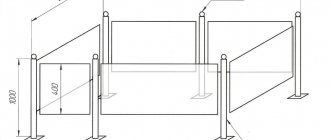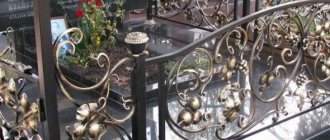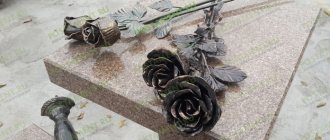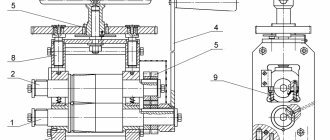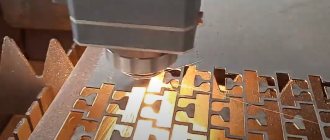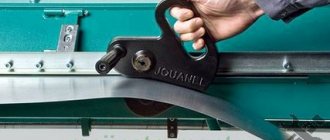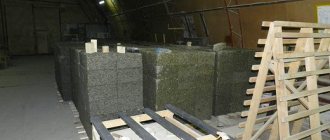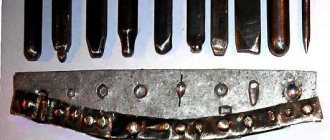In cemeteries, it is customary to fence graves. You can make fencing yourself or order it by contacting a specialized company. Today, cemetery fences are made to suit any request: from the simplest (metal, painted with any paint) to the most prestigious (for example, forged). Customers can make sketches of fences themselves or also order them from a special service.
Such products protect graves from animals. And also to give a well-groomed look.
It will be much cheaper for the relatives of the deceased to make a fence with their own hands than to order it from professionals. On the other hand, it depends on how you approach this issue. The chosen material for the fences and what sketches are created for them play a very significant role. Much also depends on the person himself. After all, in order to build a fence yourself, you will need at least minimal experience and construction skills, as well as a minimum set of standard tools. And even then, it is unlikely that you will be able to make beautiful forged or decorative stone fences on your own, without any experience.
However, if you have the same minimum experience, you can independently build simple fences near graves using materials such as concrete, plastic or metal. In this case, numerous photographs will be helpful, which are provided on almost every Internet site of companies providing funeral services. For example, you can choose both universal and specific options for fences around graves. In this case, the sketches are drawn up independently. In addition to the material, you also need to decide on your own what color of fence in the cemetery will look most appropriate in a given case.
There are several types of fences. But before you start reproducing products, it is important to find out exactly what types there are, as well as the manufacturing features and properties of each of them.
Why are fences needed in a cemetery, their features and functions?
Installing a fence in a cemetery is not a whim of relatives, it is their way to stand out. Fencing helps:
- protect the grave from the passage of other people and wild animals;
- secure the burial from accidental demolition (all graves are removed at some point if they are poorly maintained or appear abandoned).
The barrier can be installed together with a wooden Orthodox cross on the day of the funeral.
But it is better to do this after 40 days, when, according to Orthodox customs, the soul of the deceased leaves this world forever, having come to terms with its position in the Kingdom of the Lord. Experts advise installation only after the tombstone has been arranged and the monument has been installed.
What are grave fences made of?
Fences for installation around graves are most often made of metal, wood or wrought iron. Much less often, a fence around a burial site is installed from natural stone, concrete or plastic (products made from concrete and plastic are in many cases short-lived).
Manufacturing of forged fences
Made by hand from forged metal, which increases durability and cost. The final price consists of such characteristics as dimensions and the number of complex elements - patterns. If the drawing seems complex to the master (presence of small details), then he will ask for 1.5-2 times more than usual. The simplest fencing will cost approximately 6-12 thousand rubles. The cost of a product with numerous unusually shaped elements is 35-70 thousand rubles.
They combine beautifully with monuments made of granite or marble, as they have an elegant design and do not weigh down the space.
Making a concrete fence
It is inexpensive, compared to the production of a wrought-iron fence, to place concrete formwork around the perimeter of the grave, painting it or laying it with facing tiles. The approximate height of the section is 25-30 cm. It is easy to step over, but the concrete fence copes with its task of marking the location of the grave. For installation you will have to make a strip foundation.
Making a metal fence
Copper, steel or aluminum are used to produce metal fences. Steel fences (made of profile pipes or metal corners and rods) are strong and durable, manufacturing and installation work is simple. To make a good fence with your own hands:
- the craftsmen are called to the cemetery to take the necessary measurements and draw up a project or drawing;
- after determining the material and the exact size of the work to be done, an estimate is made;
- they assemble individual parts in the workshop (there is no electricity in the cemetery, so welding and other tools are used only if they are powered by an additional power source).
The finished fence is installed on the foundation. Metal parts are treated with a primer that slows down the corrosion process, and covered with acrylic paint, compounds that imitate the color of gold, silver or bronze.
The price of the fence is 5-12 thousand rubles. It depends on the presence of forged elements, the amount of work and the size of the fence.
Granite fence
Wooden fencing
The simplest and most short-lived option. You can make it yourself. To do this, into the ground around the grave mound along its perimeter:
- they dig in wooden posts, or even better - concrete pipes with a diameter of 15-20 cm (the pipe is buried in such a way that its upper part is flush with the ground);
- A wooden post pre-lubricated with grease (from moisture) is placed inside and fixed with cement mortar;
- Several poles are screwed to the posts with ordinary wire or nailed (depending on the height), and tree branches cut into pieces 45-70 cm long are attached to them.
Installation of wooden fencing can also be ordered. In this case, timber, slats and boards, decorated according to the customer’s requirements, are used. The wood is often fired to increase its strength. The price of a fence for a grave, installed with your own hands, is determined by the quality of the wood. Fences made from oak boards are more expensive than those made from pine. The average price is 10-15 thousand rubles.
Wooden fencing requires constant maintenance. Every year it needs to be inspected, repainted, and sometimes repaired. Such a fence is easy to disassemble and carry away, so it is better not to install it if the grave is located at the far end of the cemetery, out of sight of the caretakers.
Wooden fence
Fences made of natural stone
Most often made of granite or marble. They allow you to highlight the place where the grave is located, making the area neat and landscaped. The cost and installation time depend on the material, size, and special requirements for the installation method (on or without a foundation). Thus, the price of a granite fence ranges between 25 and 160 thousand rubles. This price is also explained by the durability of the stone.
Plastic fencing
They are manufactured quickly and can be installed independently. The average price is 2-3 thousand rubles per linear meter. The standard fence height is 70 cm. The service life depends on weather conditions and the quality of installation. Light fences need to be securely fixed to the ground to prevent them from being blown away in strong winds.
Manufacturing of forged fences
If a person does not have sufficient knowledge and skills to process metal, then it is better to turn to specialists, because such fences are much more difficult to make than others. The spans of forged fence structures are ordered from forges, where the metal is processed under high temperatures (the so-called hardening) to give the iron unique qualities.
Craftsmen offer various types of forging - from stamping, which is characterized by low quality, to artistic forging. The production time for stamped products is quite short. If you choose artistic forging, the time frame may increase, since artistic forging is a match for jewelry craftsmanship and does not tolerate haste. Craftsmen make various patterns and weaves, flowers and lace, depending on the wishes of the customer.
Design styles are also chosen by the customer - fences can be made in Baroque, Art Nouveau, Gothic, Empire styles, etc. Forged gates are also designed in the same style. If desired, the customer can provide the blacksmith with a sketch of a table and bench; they will complement the overall appearance of the burial.
For the manufacture of such structures, metal rods are used, the diameter of which is 12x12 mm or 16x16 mm. Profiled pipes for installation of the structure are taken with a diameter of 20x20 mm or 40x20 mm.
To begin with, metal rods are cut into pieces, after which they are forged. After forging, they are bent according to a sketch made in advance. Then, when all parts of the future structure have undergone technological processing, they need to be welded together into one structure.
To ensure that forged products last a long time, they are subjected to anti-corrosion treatment. You can also paint them in any color or use patina, which will give such a fence a noble and chic look.
A forged fence is installed on a concrete base. The only drawback of this type of fencing is their high price, which is nevertheless compensated by the durability of the structure and chic appearance.
What are the benefits of fencing made from profile pipes?
Metal fences are often made from profile pipes. It's comfortable:
- the pipe can be dug into the ground, it does not rot, and if properly processed, it does not rust, so there is no need for a foundation;
- metal is cheaper than natural stone and even wood;
- such a design is almost indestructible, the pipes can only be cut down, even a bent product can be restored;
- installation does not take much time, you can do it yourself.
Features of the production of fences made from profile pipes include:
- cutting (pipes are made to a certain length, most often several times the height of the fence);
- assembly is carried out at the grave, but chains and other decorative elements are attached in a warehouse or workshop.
The metal fence is not easy to remove or not to be noticed when the car turns around (if the grave is located near the road, it can be trampled on or even made part of the roadway).
How to make a fence for a grave from wood
Wood is the most accessible, cheapest and easiest to process material. Unfortunately, it is also the most short-lived: a wooden fence will have to be regularly painted and repaired, but even so it will not last very long. The set of tools you need is minimal: hammers, saws, a plane, measuring tools - this will be quite enough. As a rule, larch, oak, and cedar are used as materials for fencing, because these types of wood are the most resistant to the elements. Don't forget that depending on the type of wood you choose, the protective agents and paints you need may vary.
The easiest way to make a wooden fence with your own hands is to prepare all the necessary parts in advance and assemble it on site. To do this, it will be necessary to dig small concrete tubes with a diameter of 15-20 cm into the ground. They should only stick out slightly from the ground or be flush with it. Lubricate the wooden posts that will become the load-bearing support of the structure with grease and place them in concrete tubes, fill them with cement - now you have supports around the perimeter of the grave site. The entire further structure is attached to them.
An alternative method is to pre-assemble the 4 sides of the fence (assuming your gravesite is a traditional rectangular shape), and then insert the supporting supports of each side into the dug concrete tubes at the same time, and then simply connect the four sides together at their intersections ( i.e. in the corners). If you are planning to install a gate, then on one side there should be a “door” opening with hinges, which are best secured with nails or self-tapping screws in advance. The obvious advantage of assembling a wooden fence right on site is that it is easier to transport it to the cemetery in a personal car. The advantage of the second method is that this way you have less risk of damaging the structure during installation.
What size can a grave fence be?
The dimensions of the fence are determined by the parameters of the grave mound and the permissible deviations from it. But some plots in the cemetery are larger than others, accommodating just one grave, while others are 2 meters wide and 3 meters long. This is exactly the size of a standard fence.
Most likely, a large area is legally allocated for another burial expected in the future (the daughter wants to bury her father next to her mother, the children plan to be buried next to their parents).
You cannot decide on your own what size the fence will be. Even if there is a lot of space around the grave, you should notify the cemetery administration and obtain permission to carry out installation work.
Fence drawing example
Grave fences
Grave fences can be made from a variety of materials. However, each of them has certain advantages. Samples of such products will differ in manufacturing technology, degree of wear resistance, as well as type and price level.
To make a grave fence yourself, it will be important to prepare materials such as:
- metal rods;
- profile pipe;
- basic tools.
In addition, you will need at least minimal experience in welding.
The main types of fences for graves:
- forged,
- welded,
- granite,
- concrete.
If you need to install an inexpensive fence, and in the shortest possible time, you can install it from plastic. This option is very lightweight, and besides, its installation does not require any special tools.
You can also install temporary fences using chain-link mesh or PVC, with which you can even install a wicker version of the fence.
Made from concrete
Such structures are suitable for small cemeteries. The main advantage of installing such a fence over others is its low cost.
It cannot be classified as a type that can be lavishly decorated. The product is constructed using standard-sized concrete slabs, which are produced with standard patterns reminiscent of brickwork or flowers.
There is also a drawback to this type of structure - its service life, which is relatively short. This fencing method will last the longest, about fifteen years, and then the fence will have to be redone again.
From granite
Granite fences are distinguished by their original appearance. They are heavy-duty and, accordingly, very durable in use.
Forged fences
Such options are used, as a rule, by those who value not only strength, reliability and durability, but also a chic aesthetic appearance. Forged fences are resistant to temperature changes and are completely unaffected by precipitation and other phenomena. In addition, for such fences to last a long time, they do not require constant or any special care. But such options have a fairly high price category.
Metal fences
The most popular options. The difference from the others is their high degree of wear resistance, as well as their low price. For their manufacture, a metal corner/rods and a profile pipe are used. In some cases, metal fencing is made from mesh as separate sections. It all depends on what sketches are agreed upon and approved.
Metal fences are strong and reliable, and behave quite resistant to temperature changes and atmospheric conditions. They can be made in absolutely any size, and they can always be painted with any paint, choosing the most suitable color that you like. In addition, such products can be “adjusted” to any height.
Plant fence
The living fence option always looks very original. To equip it, you will need to purchase special seedlings of plants intended for hedges. As a rule, such seedlings grow very quickly, but thanks to them you can save a lot of time on fence installation work.
Types of fencing made from profile pipes
A metal profile is a cheap and fairly flexible material. You can make fences of any size and shape from them. For this purpose, pipes with a square or rectangular cross-section are used. The strength of the frame and the number of decorative parts that can be attached to it depend on the thickness and height of the pipe. Most often, customers are offered the following type of fencing:
- a fence made of pipes of different heights and thicknesses (separate sections are intended for installing racks, attaching decor and framing, cut them according to the sample);
- the posts, frame and decorative elements are made of material of the same shape and size, the differences lie in the location, the patterns are made from pipes of the same thickness as the base:
- simple design, decorated with forged parts.
When using pipes of different sizes, they try to maintain precise geometric shapes. If the patterns are made only from the profile (diamonds, squares, tetrahedrons), the design is simplified, the main thing is not to overdo it with the number of parts. The presence of forged patterns adds originality to the fence.
How to make a concrete fence
To make this type of fence, you will need ready-made special concrete blocks intended for installation and construction of fences. The panels are made from a concrete solution, to which special components are added by pouring them into molds.
The manufacture of concrete fences has some features, namely:
- Fences can only be of standard sizes.
- The fence color can also only be standard.
- The price of the products is one of the lowest, unlike other materials.
The standard width of concrete grave fences is 2 meters, and their height is 0.5 meters. Their color can be white or light gray. The only difference between concrete fences is the patterns.
The patterns come in the form of stonework or flowers.
If you are still not satisfied with this option, you can install a plastic fence, which you can paint yourself with paint of a suitable color. It will look simple and inexpensive. A stronger version of fencing made from welded mesh “gitter”. Modular fences are not only reliable, but also give an aesthetic appearance to the grave.
Installation diagram for a fence made from Gitter mesh
Drawings and examples
When making a sketch of a pipe fence, take into account the following:
- the base is made of columns with a square cross-section measuring 2.5 by 2.5 cm, 3 by 3 cm or 4 by 4 cm;
- For individual sections, pipes measuring 2 by 2 cm and 2.5 by 2.5 cm are suitable.
If you are putting a fence on a grave with your own hands, it is better to have the drawings and dimensions determined by a specialist.
When you decide to weld a fence with a height of 50-70 cm, you need to lay a gate on the diagram; not everyone remembers this. Instead, sometimes they make a chain with slack, but the first option looks better. When installing a fence made of stone or concrete, no gates are made.
Pipes:
- cut into pieces 1 m long. This is slightly higher than the size of ordinary fences around graves, but take into account that the resulting metal pins will also have to be buried in the ground;
- in the upper part, plates (size 10 by 10 cm) are attached to the ends.
If the customer has already dealt with profile pipes, he can easily install the fence himself. When installing a fence made of stone or concrete, there is also no need for special knowledge, but not everyone is able to dig a foundation correctly and lay facing tiles. It is better to negotiate with a company that installs monuments.
To increase the strength of a metal or wooden structure, it is filled with concrete. In the drawing of the fence, you need to indicate the location of the holes for the posts, their width and depth (usually pipes or supports are dug in to a depth of 40 cm, the foundation is also made shallow).
You can make a rough drawing yourself, but it is better to order the fence from the same place where the monument is made. In this case, you can already understand from the first sketches whether these structures are suitable for each other, whether they make it heavier, turning the burial into a gloomy memorial.
How and what to prepare for building a grave fence yourself
Of course, the main thing that should influence the choice of material and design of the fence is the existing work experience. Regardless of which material you ultimately choose, you should already have a minimum amount of experience working with it. Even if we are talking about a simple wooden structure, you must take into account that a fence for a grave is a much more important thing than a wooden shelf for a closet, because the fence will stand in the open air and endure the blows of all the elements. So, let's say that you have a minimum set of skills and tools to work with the relevant materials. Again, regardless of the actual material, your first step will always be to draw up a sketch. Measure the grave area, decide on the length and height of the fence, think about the shape and size of decorative materials, decide whether a gate is needed and what size the passage will be, etc. Also be sure to consider the installation method, since depending on the choice you make, you may need to seriously change the design of the fence itself.
In our material we will look at wooden, metal and concrete barriers, because they are the most affordable to make at home. Please note that we deliberately do not mention forged fences: they are too difficult to manufacture for a non-professional and require special equipment.
How to install a fence around a grave
A separate fee is charged for installing a fence around the grave, on average 3-6 thousand rubles. The following installation options are available:
- In the basement. Concrete or granite are used to make the foundation. The need for a base arises when ordering a fence made of stone or concrete. The finished structure can be tiled or varnished.
- Digging holes for supports without subsequently concreting them. The ends of the posts made of metal or wood are lowered into dug holes, at least 30 cm deep, and secured with broken bricks or stones. This is an unreliable design, but it is free. Stones and broken bricks can be found around the farm. Suitable for installing self-made wooden fences. You will often have to repair such a fence in a cemetery with your own hands. After winter, the soil will try to squeeze out the unprotected column; it will need to be dug up and strengthened again.
- Pits for concrete supports. The holes for the posts are dug deep, their bottom is below the freezing line of the soil in winter. The pegs are installed in the center of the hole, fixed and filled with cement. The solution is prepared right next to the grave. At the same time, you can think about cementing the entire surface around the grave or covering it with tiles.
If you are interested in how to make a fence in a cemetery with your own hands, you should know that there is nothing complicated in the production of an ordinary wooden product. But making forged or stone ones will not be easy. In addition to nails, a shovel, and a saw, you will need tools for metal cutting, grinding, and welding. You will also have to calculate the size of the fence yourself. If there is such an opportunity, it is better to entrust the matter to specialists and study photos of finished models.
Making a metal fence
Metal fences are made in two ways - using a corner with a width of 25 mm and a rod with a diameter of 6 mm or a profiled pipe (25x25 mm). The pipe is usually round or square. They consist of metal spans, posts and gates.
In order to make a metal fencing structure yourself, you need to follow the rules. First, take the exact dimensions of the future structure. Then prepare and measure the material, based on standard or personal sketches. Most often, when making a metal fence, a geometric pattern is used.
When the material is accurately measured, you can start cutting it. Then the cut structures are welded and a protective layer is applied. In other words, an anti-corrosion coating that can protect the metal from oxidation. In another way, the metal can be cleaned, primed and painted, which will also reliably protect it from weather influences.
The assembly of the components of the fence must be done directly at the burial site, using the method of welding or metal fastening. For installation, you need to install durable supporting structures in the form of steel pipes, concrete or brick columns. It is better to install the structure on a solid concrete foundation. A metal fence, unlike a forged one, can be made with your own hands; you do not need to have any special skills for this. Fences of this type are durable and inexpensive; they are suitable as a simple option for saving burials.
How to install a monument with your own hands: instructions
How many bricks are in a pallet: calculations

